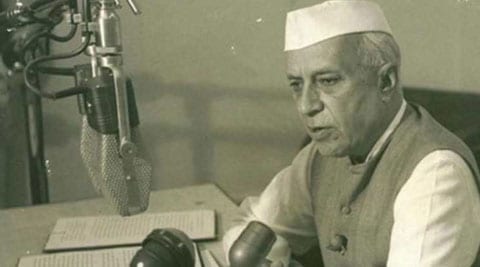Inder Malhotra
The Indian Express
10 November 2014
On
Jawaharlal Nehru’s 125th birth anniversary, rather than write a comprehensive
article on the life and leadership of independent India’s first and
incomparable prime minister yet again, I intend to give readers, especially the
young ones, some glimpses of the personality of the second greatest Indian of
our times, after the Mahatma. So here goes the first of the series, focused on
Nehru’s phenomenal and matchless popularity with the masses. In November 1937,
in the Calcutta-based and highly respected magazine Modern Review, appeared an
anonymous article on Nehru, arguing that men like him were “dangerous” and
potential “dictators”. “From the North to Cape Comorin,” said the article, “he
has gone like some triumphant Caesar, leaving a trail of glory and a legend
behind him. Is it just a passing fancy or is it his will to power that is
driving him from crowd to crowd… He calls himself a democrat and a socialist
and no doubt he does so in all seriousness… but a little twist and he might
turn into a dictator… His conceit is already formidable. It must be checked. We
want no Caesars”. It soon became known that the author of this denunciatory
article was none other than Jawaharlal, and the matter was laughed out. Indeed,
he was soon re-elected Congress president for the third time.

Even
as a schoolboy then I used to hear my father and his friends discuss
“Panditji’s astonishing popularity”. By the time I joined college, I also
joined all those who would travel scores of miles to hear Nehru if he was
speaking or simply to catch a glimpse of him, if he was merely passing through.
After a long but unsuccessful search for a job in journalism barely two years
after Independence and Partition, I had a stroke of luck. A rather impecunious news
agency, the United Press of India, gave me a job after making sure that I could
report not only Nehru’s speeches in Hindi but also those of Maulana Azad in
Urdu. No break could have been better than this because, for over five years, I
travelled with or ahead of the prime minister across the country and watched
the magical mutual relationship between him and the large crowds that waited
for him patiently for hours, regardless of how inclement the weather was. Often
I wondered why he chose to speak on subjects that were way above the heads of
his huge and adoring audiences: the need for planning; the newly built dams
being the temples of the new age; his reasons for pleading for China’s
admission to the UN and so on. Perhaps he believed that, in a largely
illiterate country, the spoken word was the best medium to convey his message
to his people. However, only during the last decade, when no one in the UPA
government thought it necessary to explain anything to the people at large, did
I realise how right Nehru was. By the time the Constitution came into force on
January 26, 1950, Nehru had totally disproved his self-analysis in Modern
Review. Far from becoming a dictator — which he could have done easily, like
his two contemporary leaders of freedom movements, Sukarno in Indonesia and
Kwame Nkrumah in Ghana — he built India up as the world’s largest democracy.
This process took a huge leap forward with the first general elections in this
country in 1952, when his contact with and appeal to his people also took a big
stride. He won the first three general elections hands down, almost
single-handedly, as a famous cartoon by the country’s premier cartoonist, R.K.
Laxman, depicted at the height of the campaign for the first poll. In the 1967
election, the first without Nehru, the Congress tally plummeted. Interestingly,
in his book India After Gandhi, published in 2007, Ramachandra Guha wrote that
the “extraordinary popular appeal of the prime minister” could be best captured
“in the testimony of the confirmed Nehru-baiter D.F. Karaka, editor of a
popular Bombay weekly, the Current”. Guha has then quoted at some length how
Karaka had reported Nehru’s first election speech in Bombay at Chowpatty beach
to an enormous and enthusiastic crowd. Karaka first noted — “no doubt to his
regret” — the “instant affinity between the speaker and his audience” and then
went on calculating how many votes had been swung to Nehru’s favour by his
every sentence. The climax was reached, in Karaka’s view, at the twilight hour,
when Nehru told the gathering that he had taken upon himself the “role of a
mendicant beggar”. Amidst wild cheers he added, “If at all I am a beggar, I am
begging for your love, your affection and your enlightened cooperation in
solving the problems facing the country.” The crowds were deeply moved and he,
in turn, was moved by them. For Karaka, however, the election was over. At an
elite meeting in the national capital, Nehru had once said: “Delhi is a static
city with a dead atmosphere. I therefore go out and see masses of people, my
people, your people and derive inspiration from them. There is something
dynamic and growing with them and I grow with them. I also enthuse with them.”
What he wrote to Lady Edwina Mountbatten after the meeting in Bombay is even
more eloquent: “Wherever I have been, vast multitudes gather at my meetings and
I love to compare them, their faces, their dress, their reactions to me and
what I say… I rather enjoy these fresh contacts with the Indian people… The
effort to explain to them in simple language our problems and our difficulties,
and to reach the minds of these simple folk, is both exhausting and
exhilarating. As I wander about, the past and the present merge into one
another, and this merger leads me to think of the future.”
The writer is a Delhi-based political commentator.


कोई टिप्पणी नहीं:
एक टिप्पणी भेजें